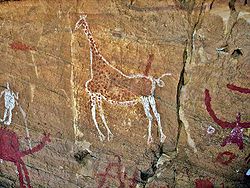 This desolate part of Libya contains some of the world’s most unique primitive rock art
This desolate part of Libya contains some of the world’s most unique primitive rock art
The civil war now in progress in Libya is threatening everything there – especially the country’s historical sites that go back more than 3,000 years. The somber news of what is happening there was conveyed by what was the last archeological team, who left the country for Italy, and reported this to the Nature Middle East news site on March 3. The eleven Italian archeologists who were evacuated from a combined archeological project at Acacus and Messak where some of the best examples of prehistoric rock art are found. Some of the paintings in caves from this region date back more than 12,000 years and was shown graphically to movie audiences in the 1996 Oscar winning film The English Patient.
The Acacus rock paintings are so unique that the site was proclaimed by UNESCO in 1985 as a World Heritage Site.
The ancient rock and cave paintings are particularly interesting to both archeologists and anthropologists, as they depict the different climate factors in periods of civilization ranging from prehistoric times until the 1st or 2nd Century CE.
Various species of wildlife, including plains and even forest animals that have long since disappeared from this region are vividly displayed in these drawings, as well as the peoples who hunted them.
Although Tripoli’s two major museums are still considered as safe from looters and from vandalism, archeological sites themselves are under threat as they are not being guarded as much as they were prior to the outbreak of public protests against Muamar al Gadaffi and his regime, which has been in power in Libya since 1969.
 Theatre at Leptus – under threat?
Theatre at Leptus – under threat?
Libya’s coastal archeological sites were mentioned previously as being endangered by offshore oil and gas exploration and production; including those at Sabratha, Leptus Macna (both near Tripoli) and Appolonia, east of Benghazi.
As reported in the Nature article, interest in Libyan archeology began there after the country regained its independence from Italy in 1951. The coastal sites, which contain artifacts from periods of ancient Greece and Rome, received the most attention. The development of desert agricultural projects, including the unique pivot irrigation ones in the desert are also threatening various heritage sites.
But at present, all of these projects, both the archeological ones and the desert irrigation projects like the world’s largest artificial river may be threatened by the civil unrest.
Archeological teams, as well as other foreign entities working in Libya will simply have wait this period out and see what happens after the dust settles. Hopefully, the “dust” that settles will not be all that remains of these historical sites.
Photos via Temehu.com
Read more on Libyan archeological and desert development sites:
Libya’s Pivot Irrigation in the Sahara Proves Money can do Anything
BP Deep Drilling in Libya Threatens Archeological Sites
Gaddafi’s Green Projects Under Threat from Civil Unrest





Comments are closed.